Related Research Articles
Garage rock is a raw and energetic style of rock and roll that flourished in the mid-1960s, most notably in the United States and Canada, and has experienced a series of subsequent revivals. The style is characterized by basic chord structures played on electric guitars and other instruments, sometimes distorted through a fuzzbox, as well as often unsophisticated and occasionally aggressive lyrics and delivery. Its name derives from the perception that groups were often made up of young amateurs who rehearsed in the family garage, although many were professional.
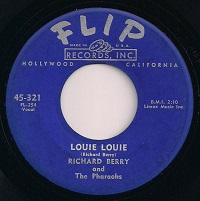
"Louie Louie" is a rhythm and blues song written and composed by American musician Richard Berry in 1955, recorded in 1956, and released in 1957. It is best known for the 1963 hit version by the Kingsmen and has become a standard in pop and rock. The song is based on the tune "El Loco Cha Cha" popularized by bandleader René Touzet and is an example of Afro-Cuban influence on American popular music.

Richard Berry, Jr. was an American singer, songwriter and musician, who performed with many Los Angeles doo-wop and close harmony groups in the 1950s, including The Flairs and The Robins.
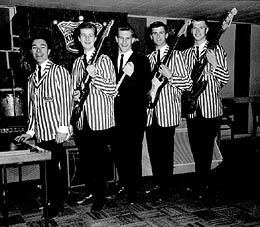
The Kingsmen are a 1960s American rock band from Portland, Oregon. They are best known for their 1963 recording of R&B singer Richard Berry's "Louie Louie", which held the No. 2 spot on the Billboard charts for six weeks and has become an enduring classic.
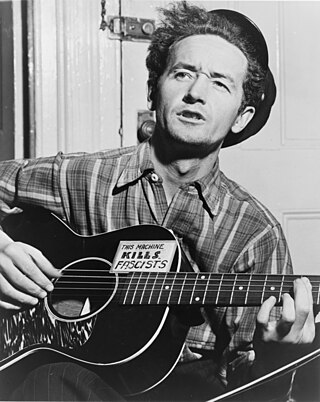
The music of Oregon reflects the diverse array of styles present in the music of the United States, from Native American music to the contemporary genres of rock and roll, country, rhythm and blues, jazz, pop, electronic music, and hip hop. However, throughout most of its history, the state has been relatively isolated from the cultural forces shaping American music. Much of modern popular music traces its roots to the emergence in the late 19th century of African American blues and the growth of gospel music in the 1920s. African American musicians borrowed elements of European and Indigenous musics to create new American forms. As Oregon's population was more homogeneous and more white than the United States as a whole, the state did not play a significant role in this history.

Paul Revere & the Raiders were an American rock band formed in Boise, Idaho, in 1958. They saw considerable U.S. mainstream success in the second half of the 1960s and early 1970s. The band was known for including Revolutionary War-style clothes in their attire.

The Sonics are an American garage rock band from Tacoma, Washington that formed in 1960. Their aggressive, hard-edged sound has been a major influence on punk and garage music worldwide, and they have been named inspirations to the White Stripes, LCD Soundsystem, and other musical artists.
The Wailers, often known as The Fabulous Wailers, were an American rock band from Tacoma, Washington. They became popular in the Pacific Northwest from the late 1950s to the early 1960s, performing saxophone-driven R&B and Chuck Berry rock and roll. Their biggest hit was "Tall Cool One", first released in 1959, and they have been credited as being "one of the very first, if not the first, of the American garage bands."

Merrilee Rush is an American singer, best known for her recording of the song "Angel of the Morning", a top-10 hit which earned her a Grammy nomination for female vocalist of the year in 1968.
Seattle is the largest city in the U.S. state of Washington and has long played a major role in the state's musical culture, popularizing genres of alternative rock such as grunge and being the origin of major bands like Alice in Chains, Soundgarden, Pearl Jam, Screaming Trees, Mudhoney, Foo Fighters, and most notably, Nirvana. The city remains home to several influential artists, bands, labels, and venues.
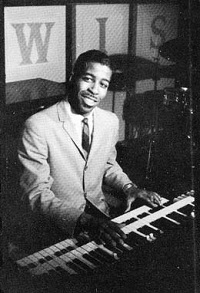
David Eugene Lewis was an American rock and rhythm & blues (R&B) keyboardist, organist, and vocalist based in Seattle, Washington, US. Peter Blecha accounts his Dave Lewis Combo as "Seattle's first significant African American 1950s rock and roll band" and Lewis himself as "the singularly most significant figure on the Pacific Northwest's nascent rhythm & blues scene in the 1950s and 1960s."

X-15 is an American rock band formed in Bellingham, Washington in 1979 by lead singer Kelly Mitchell, guitarist Eric Alton, bass player Tim Lollar, keyboardist Erik Rohrer, and drummer Todd Fuhs. They are best known as one of the most successful alternative bands operating out of Seattle during the years 1980 through 1987, leading up to the Seattle grunge explosion, and for their cult-classic song "Vaporized".
Lawrence Fewell Roberts II, known as Robin Roberts and in his music career as "Rockin' Robin" Roberts, was an American singer best known for his performances in the early 1960s with the Wailers, a rock and roll band based in Tacoma, Washington. His best known record was the earliest cover version of Richard Berry's "Louie Louie", recorded in 1960 and released the following year.
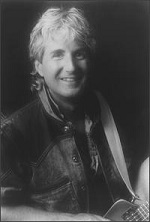
Jack Brown Ely was an American guitarist and singer, best known for singing the Kingsmen's version of "Louie Louie". Classically trained in piano, he began playing guitar after seeing Elvis Presley on television. In 1959, he co-founded the Kingsmen and with them recorded "Louie Louie" in 1963; Ely's famously incoherent vocals were partly the result of his braces and the rudimentary recording method. Before the record became a hit Ely was forced out of the group and began playing with his new band, the Courtmen. Ely died in Terrebonne, Oregon, on April 28, 2015, at age 71.

Jini Dellaccio was an American photographer best known for her images of rock and pop acts of the 1960s, particularly in the Pacific Northwest. Her photographs of the Sonics, the Wailers, Merrilee Rush, the Daily Flash and many others were frequently used for album covers, posters, and publicity stills, and - along with her shots of major acts such as Neil Young, the Rolling Stones, the Beach Boys, and The Who - have been widely reproduced in books, CDs, articles, and gallery exhibitions.
The Frantics or The Four Frantics were an American rock and roll group based in Seattle, Washington in the 1950s and 1960s. They signed to Dolton Records in 1959 and had several songs on the Billboard Hot 100.
Kearney Whitsell Barton was an American record producer active in Seattle, Washington, from the 1950s to the 2000s. Particularly known for his 1950s and 1960s-era recordings of garage rock bands, Barton recorded many Pacific Northwest musicians such as The Fleetwoods, The Ventures, The Wailers, The Sonics, The Frantics, The Kingsmen, Quincy Jones, Ann and Nancy Wilson, Bonnie Guitar, and Dave Lewis.
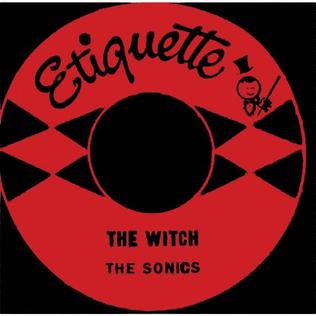
"The Witch" is a song by the American garage rock band the Sonics, written by vocalist Gerry Roslie, and first released as the group's debut single in November 1964. It also appears on the Sonics' debut album Here Are the Sonics!!!. Arguably among the most frantic and heaviest recordings of the era, "The Witch" is regarded as being a quintessential stepping stone in the development of punk rock despite the fact the tune never reached national success. Since the song's original release, "The Witch" has appeared on numerous compilation albums, most notably the 1998 reissue of Nuggets: Original Artyfacts from the First Psychedelic Era, 1965–1968.
The Wilde Knights were an American garage rock band from Longview, Washington, who were active in the 1960s. They emerged from a group known as the Furys and later the Pipers VI, who recorded several frat rock records. After becoming the Wilde Knights, they wrote and recorded two songs in 1965 which were both released as singles that year and are now recognized as garage rock classics, "Beaver Patrol" and "Just Like Me", the latter of which later provided a huge hit for Paul Revere & the Raiders. In the late 1960s they evolved into Genesis, the King Biscuit Entertainers, and American Cheese, and issued records under those various names.
Peter Charles Blecha is an American historian, curator, essayist, author, and director of the Seattle-based Northwest Music Archives. He is primarily known for research related to aspects of Pacific Northwest musical history. In addition to his books, essays, and album liner notes, Blecha has also served in multiple consulting and curatorial positions.
References
- ↑ Ko, Michael (August 25, 2003). "754 guitars rock into the record book with 'Louie Louie'". The Seattle Times. Retrieved November 10, 2022.
- ↑ Blecha, Peter (November 10, 2022). "Garage Rock Anthem "Louie Louie" Turns 50". The Seattle Times . Retrieved July 21, 2019.
- ↑ Blecha, Peter (April 1, 2007). ""Louie Louie" Through The Ages". The Seattle Times . Retrieved November 10, 2022.